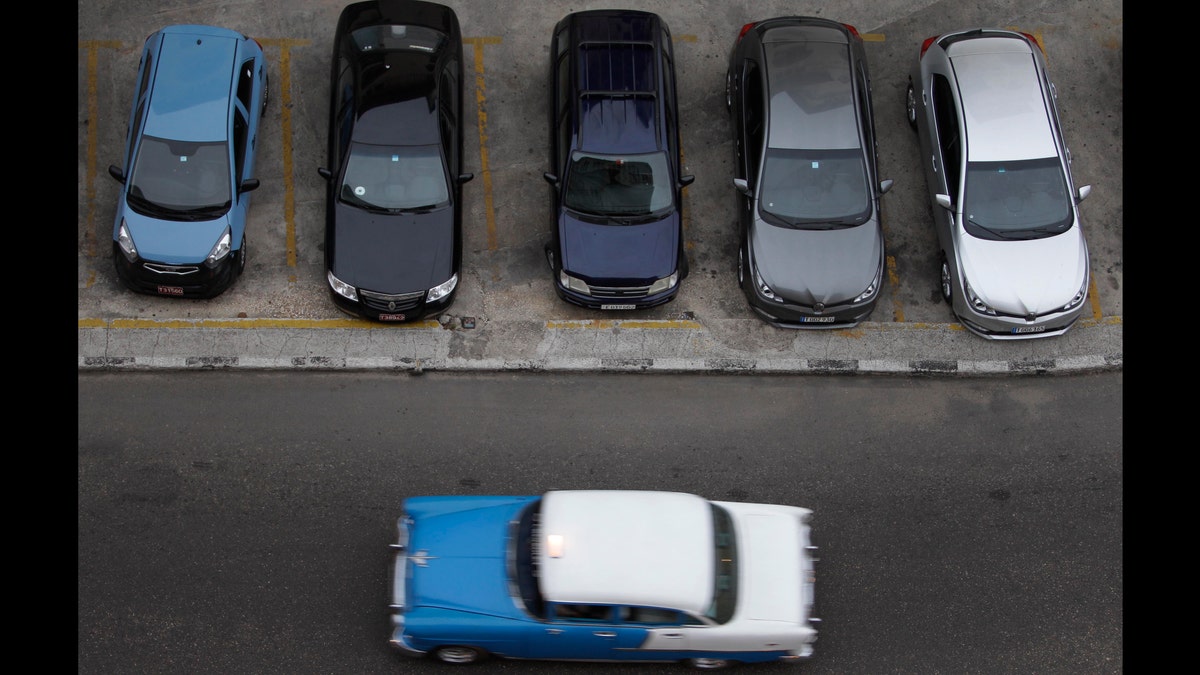
A vintage automobile drives by a parking lot of modern vehicles in Havana, Cuba, Thursday, Dec. 19, 2013. According to official media the government is opening the automobile market by eliminating the special permit that strictly limited the number of people allowed to buy vehicles from the state. (AP Photo/Franklin Reyes) (AP2013)
HAVANA (AP) – Cuba is opening its automobile market and its roads to thousands of late-model cars by eliminating a special permit that sharply restricted the number of people allowed to buy vehicles from the state, the government announced Thursday.
The communist government has a monopoly on the sale of imported vehicles. It has long required any potential buyer to obtain a special card from the Transport Ministry authorizing the purchase of a car.
Potential buyers have been required to prove they obtained the cash for a car through approved means like working overseas as a state-employed doctor, musician or artist. Money from relatives abroad, a source of disposable income for hundreds of thousands of Cubans, didn't merit a card.
Even for successful applicants, the cards took months or years to obtain, creating a black market in which people with ready cash would buy permits for more than the price of vehicles themselves. The government had slowed the issue of cards to a trickle in recent months as it came up with the regulations it plans to make public in coming weeks.
The government lifted restrictions on the sales of used cars between individuals two years ago but the artificial shortage of imported cars raised the prices of all vehicles on the island, meaning even Cuba's iconic, decades-old American-made jalopies sell for tens of thousands of dollars despite their often decrepit condition. Cuba has no car factories.
President Raul Castro has been slowly allowing private enterprise into Cuba's state-controlled economy and reducing the number and complexity of economic regulations in recent years, often opening a sector but imposing new restrictions when officials start to feel changes are happening too quickly or creating unexpected problems.
"It's become clear that while private sales of cars between individuals has developed smoothly, the sale of cars using 'authorization cards' has been inadequate and obsolete," the Communist Party newspaper Granma declared. "The card, apart from being overly bureaucratic, became a source of speculation and illicit self-enrichment."
In coming days, Granma said, "steps will be taken to eliminate restrictions that lost their reason for being with the passage of time. Administrative shackles that created opportunities for illegal activity will also disappear."
Foreign workers and Cubans with disposable income had been growing increasingly frustrated with the paralyzing wait for cars in recent months, some resorting to bribing government workers in order to move up the lists of those waiting for permits.
"It's the best thing they could have done for us Cubans. This way everyone can have better transportation. It's the best thing they've ever done," said Virgen Ruiz, a 24-year-old manicurist seated outside Havana's Peugeot dealership, which has cars on display but only sells them to the government, which then adds taxes and fees and sells them on to private clients.
"That is what we Cubans have been hoping for a long time, that the law be for everyone and not just some privileged people whom travel such as sailors," said Rafael Garcia, 47, a merchant marine.
"I imagine the prices won't be accessible for all, but at least there's a chance at something better," Garcia added.
Granma said the government would be selling new and used cars, motorcycles, small trucks and microbuses to Cubans and resident foreigners but did not offer details of the new process for buying a vehicle.
Prices would be similar to those on the private used-car market, it said.
Follow us on twitter.com/foxnewslatino
Like us at facebook.com/foxnewslatino








































